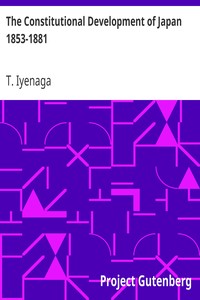The Constitutional Development of Japan 1853-1881 by T. Iyenaga
"The Constitutional Development of Japan 1853-1881" by T. Iyenaga is a historical account written in the late 19th century, specifically aiming to chronicle the evolution of Japan's political structure during a critical period of transformation. The book primarily discusses the constitutional changes prompted by Japan's encounter with Western powers and the subsequent shifts in governance from a feudal system to a constitutional monarchy. In this work, Iyenaga outlines the significant events that
contributed to Japan's political renovation, beginning with the arrival of Commodore Perry and the treaties that followed. He examines the collapse of the Shogunate, the restoration of imperial power, and the abolition of feudalism, emphasizing the roles played by key figures such as the leaders of the Restoration and various Daimios. The text highlights the social, educational, and economic changes that facilitated the emergence of representative government ideals, culminating in the Emperor's Charter Oath of 1869 and the eventual establishment of a parliamentary system in 1890. Through this narrative, Iyenaga provides an insightful analysis of how Japan's historical context shaped its political evolution and adaptation to modern governance. (This is an automatically generated summary.)
Read or download for free
| How to read | Url | Size | |||
|---|---|---|---|---|---|
| Read now! | https://www.gutenberg.org/ebooks/12355.html.images | 131 kB | |||
| EPUB3 (E-readers incl. Send-to-Kindle) | https://www.gutenberg.org/ebooks/12355.epub3.images | 127 kB | |||
| EPUB (older E-readers) | https://www.gutenberg.org/ebooks/12355.epub.images | 127 kB | |||
| EPUB (no images, older E-readers) | https://www.gutenberg.org/ebooks/12355.epub.noimages | 110 kB | |||
| Kindle | https://www.gutenberg.org/ebooks/12355.kf8.images | 291 kB | |||
| older Kindles | https://www.gutenberg.org/ebooks/12355.kindle.images | 281 kB | |||
| Plain Text UTF-8 | https://www.gutenberg.org/ebooks/12355.txt.utf-8 | 114 kB | |||
| Download HTML (zip) | https://www.gutenberg.org/cache/epub/12355/pg12355-h.zip | 124 kB | |||
| There may be more files related to this item. | |||||
Similar Books
About this eBook
| Author | Iyenaga, T. (Toyokichi), 1862-1936 |
|---|---|
| Title |
The Constitutional Development of Japan 1853-1881 Johns Hopkins University Studies in Historical and Political Science, Ninth Series |
| Credits | E-text prepared by Juliet Sutherland, Louise Valmoria, David King, and the Project Gutenberg Online Distributed Proofreading Team |
| Reading Level | Reading ease score: 57.1 (10th to 12th grade). Somewhat difficult to read. |
| Language | English |
| LoC Class | H: Social sciences |
| Subject | Constitutional history -- Japan |
| Category | Text |
| EBook-No. | 12355 |
| Release Date | May 1, 2004 |
| Most Recently Updated | Oct 28, 2024 |
| Copyright Status | Public domain in the USA. |
| Downloads | 387 downloads in the last 30 days. |
| Project Gutenberg eBooks are always free! | |

